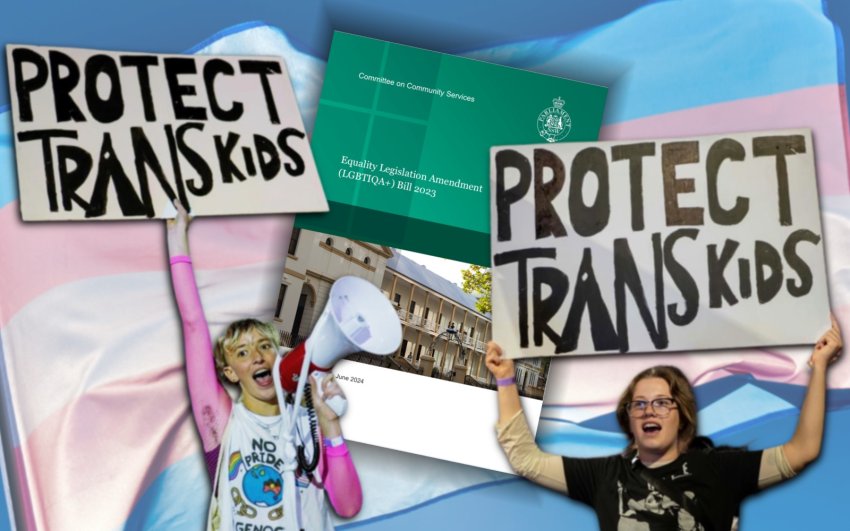
LGBTIQ organisations across New South Wales welcomed the findings of a parliamentary inquiry that recommended MPs pass an equality bill which would strengthen and add protections for LGBTIQ people.
Eighty organisations sent a letter to NSW Premier Chris Minns in April urging him to support the bill.
They included the Australian Services Union, NSW Council of Social Services, Twenty10, Women’s Health NSW, Women’s Electoral Lobby, Pitt Street Uniting Church, the Black Dog Institute and Rainbow Families.
But transphobic groups are pushing their campaign to undermine support for equality.
The Committee for Community Services (CCS) released a report on June 3 which said MPs should pass the Equality Legislation Amendment (LGBTIQA+) Bill 2023, introduced in June last year by Independent MP Alex Greenwich.
Greenwich’s bill aims to add protection for bisexual, asexual, non-binary people and sex workers, and allow transgender people to change their gender on identification documents, including children under the age of 16, without the need for surgery.
It would also amend 20 laws, including the Anti-Discrimination Act 1977.
It recommended new measures and funding to address the safety and well-being of LGBTIQ people.
The proposed amendments include closing loopholes that allow religious institutions to discriminate against LGBTIQ people and their families, and ensuring trans people can access birth certificates and identification documents without cruel barriers.
It also proposes to make it easier for trans youth under the age of 16 to seek medical intervention without the need for parental consent.
National LGBTIQ organisation Equality Australia (EA) CEO Anna Brown urged MPs to bring NSW in line with the rest of the country.
NSW last to amend laws
NSW is the last state to require trans people to have surgery on their reproductive organs before they can amend ID documents to recognise them for who they are, she said.
“Our communities and their families live with some of the nation’s most outdated and discriminatory laws.”
“Historic laws banning conversion practices were recently passed in NSW in the first major reform for our community in almost a decade. Now we need to ensure our laws change so that all people and families are equal in NSW.”
The Conversion Practices Ban Act 2024, which became law on March 22, bans practices directed to changing, or suppressing, the sexual orientation or gender identity of individuals. It also makes it illegal for someone to be removed from the state to undergo conversion therapy.
Forced conversion practices are still legal in Tasmania and South Australia, while Queensland has a ban only in healthcare settings.
Dr Amanda Cohn said on June 6 that the Greens want to see the bill “improve access to gender affirming care and empower young people, in particular, to make informed decisions about their own health”.
She said the government had “unnecessarily delayed” the bill by having an inquiry which “delayed and deferred protecting LGBTQIA+ people and exposed them to further harm by platforming bigotry”.
Faith-based and conservative LGBTIQ groups opposed to the changes have used that time to campaign against the bill. Using transphobic fear-mongering, they used their submissions to argue against every amendment.
Bishop Michael Stead, chair of Freedom for Faith, is concerned that limits are being placed on religious institutions’ exemptions to discriminate, arguing that “exemptions are needed to maintain the religious character of an institution”.
Viviane Morrigan, from the Coalition of Activist Lesbians Australia, said the bill is a “misogynist attack on women and children” as it “would make gender identity legal and erase female sex, same-sex attraction and lesbian identity”.
Transphobic group Genspect Australia, which is linked to similar groups in the United States, said Labor is not listening to the “overwhelming public opposition”. Judith Hunter, Genspect Australia spokesperson, said the bill “seriously diminishes the rights of women and girls, permits children to change their name and sex on their birth certificate without parental consent”.
She said it would lead to “more children with gender confusion making life-altering changes which they may later regret”.
But, as Worldwide Transgender Clinic documents, this is a disingenuous scare tactic.
International surveys with trans or gender non-conforming people on “detransitioning” have found a very small number feel regret post-surgery or after beginning medication.
Sport exclusions remain
Although the bill is supported overall by LGBTIQ organisations, some aspects do raise questions.
For example, amendment [12] Section 38P, aimed at better protecting trans youth participating in sport, only offers to “narrow the existing exception for sport that allows discrimination on the grounds of sex”, not to eliminate it altogether.
It says it would still allow discrimination against trans youth in these settings if: the person is over the age of 12; the sporting activity is conducted as part of a competition; and the strength, stamina or physique of a person competing in the competition is relevant.
As most sport is conducted as part of a competition and “strength, stamina and physique” are relevant in most if not every sporting activity, this amendment will not help trans youth who want to compete.
Even so, conservative groups also oppose this amendment.
Before the inquiry into the bill began, the committee invited the public to complete a survey. An organised campaign delivered an overwhelming opposition to all the proposed amendments: 85% opposed the bill and 723 duplicate responses (mostly opposing the bill) were submitted from the same email addresses.
The duplicate responses made it appear the public has no interest in furthering LGBTIQ equality. But the opposite is the case.
Surveys conducted by EA in 2020 and international research group Ipsos in 2023 shows that an overwhelming majority of Australians support trans equality.
Sixty-six per cent of respondents in the EA survey agreed that religious schools should not have the power to discriminate against trans people through firing or expulsion. The same number agreed that young people should have access to health care that would affirm their true gender.